java write a program to evaluate the postfix expression the
java write a program to evaluate the postfix expression
the program should ask users for input and show the postfix epression and then the result.
and to have a try and catch exception since we have an empty stack
Solution
Postfix.java
import java.util.Scanner;
public class Postfix
{
/**
* Reads and evaluates multiple postfix expressions.
*/
public static void main (String[] args)
{
String expression, again;
int result;
try
{
Scanner in = new Scanner(System.in);
do
{
PostfixEvaluator evaluator = new PostfixEvaluator();
System.out.println (\"Enter a valid postfix expression: \");
expression = in.nextLine();
result = evaluator.evaluate (expression);
System.out.println();
System.out.println (\"That expression equals \" + result);
System.out.print (\"Evaluate another expression [Y/N]? \");
again = in.nextLine();
System.out.println();
}
while (again.equalsIgnoreCase(\"y\"));
}
catch (Exception IOException)
{
System.out.println(\"Input exception reported\");
}
}
}
PostfixEvaluator.java
//import datastructures.ArrayStack;
import java.util.StringTokenizer;
public class PostfixEvaluator
{
/** constant for addition symbol */
private final char ADD = \'+\';
/** constant for subtraction symbol */
private final char SUBTRACT = \'-\';
/** constant for multiplication symbol */
private final char MULTIPLY = \'*\';
/** constant for division symbol */
private final char DIVIDE = \'/\';
/** the stack */
private ArrayStack<Integer> stack;
/**
* Sets up this evaluator by creating a new stack.
*/
public PostfixEvaluator()
{
stack = new ArrayStack<Integer>();
}
/**
* Evaluates the specified postfix expression. If an operand is
* encountered, it is pushed onto the stack. If an operator is
* encountered, two operands are popped, the operation is
* evaluated, and the result is pushed onto the stack.
* //param expr String representation of a postfix expression
* //return int value of the given expression
*/
public int evaluate (String expr)
{
int op1, op2, result = 0;
String token;
StringTokenizer tokenizer = new StringTokenizer (expr);
while (tokenizer.hasMoreTokens())
{
token = tokenizer.nextToken();
if (isOperator(token))
{
op2 = (stack.pop()).intValue();
op1 = (stack.pop()).intValue();
result = evalSingleOp (token.charAt(0), op1, op2);
stack.push (new Integer(result));
}
else
stack.push (new Integer(Integer.parseInt(token)));
}
return result;
}
/**
* Determines if the specified token is an operator.
* //param token String representing a single token
* //return boolean true if token is operator
*/
private boolean isOperator (String token)
{
return ( token.equals(\"+\") || token.equals(\"-\") ||
token.equals(\"*\") || token.equals(\"/\") );
}
/**
* Performs integer evaluation on a single expression consisting of
* the specified operator and operands.
* //param operation operation to be performed
* //param op1 the first operand
* //param op2 the second operand
* //return int value of the expression
*/
private int evalSingleOp (char operation, int op1, int op2)
{
int result = 0;
switch (operation)
{
case ADD:
result = op1 + op2;
break;
case SUBTRACT:
result = op1 - op2;
break;
case MULTIPLY:
result = op1 * op2;
break;
case DIVIDE:
result = op1 / op2;
}
return result;
}
}
ArrayStack.java
import java.util.Arrays;
public class ArrayStack<T> implements StackADT<T> {
private final static int DEFAULT_CAPACITY = 100;
private int top;
private T[] stack;
/**
* Creates an empty stack using the default capacity.
*/
public ArrayStack() {
this(DEFAULT_CAPACITY);
}
/**
* Creates an empty stack using the specified capacity.
*
* //param initialCapacity the initial size of the array
*/
public ArrayStack(int initialCapacity) {
top = 0;
stack = (T[]) (new Object[initialCapacity]);
}
/**
* Adds the specified element to the top of this stack, expanding the
* capacity of the array if necessary.
*
* //param element generic element to be pushed onto stack
*/
public void push(T element) {
if (size() == stack.length) {
expandCapacity();
}
stack[top] = element;
top++;
}
/**
* Creates a new array to store the contents of this stack with twice the
* capacity of the old one.
*/
private void expandCapacity() {
stack = Arrays.copyOf(stack, stack.length * 2);
}
/**
* Removes the element at the top of this stack and returns a reference to
* it.
*
* //return element removed from top of stack
* //throws EmptyCollectionException if stack is empty
*/
public T pop() throws EmptyCollectionException {
if (isEmpty()) {
throw new EmptyCollectionException(\"stack\");
}
top--;
T result = stack[top];
stack[top] = null;
return result;
}
/**
* Returns a reference to the element at the top of this stack. The element
* is not removed from the stack.
*
* //return element on top of stack
* //throws EmptyCollectionException if stack is empty
*/
public T peek() throws EmptyCollectionException {
if (isEmpty()) {
throw new EmptyCollectionException(\"stack\");
}
return stack[top - 1];
}
/**
* Returns true if this stack is empty and false otherwise.
*
* //return true if this stack is empty
*/
public boolean isEmpty() {
return (top == 0);
}
/**
* Returns the number of elements in this stack.
*
* //return the number of elements in the stack
*/
public int size() {
return top;
}
/**
* Returns a string representation of this stack.
*
* //return a string representation of the stack
*/
public String toString() {
String result = \"\";
for (int scan = 0; scan < top; scan++) {
result = result + stack[scan] + \"\ \";
}
return result;
}
}
StackADT.java
public interface StackADT<T>
{
/**
* Adds the specified element to the top of this stack.
* //param element element to be pushed onto the stack
*/
public void push(T element);
/**
* Removes and returns the top element from this stack.
* //return the element removed from the stack
*/
public T pop();
/**
* Returns without removing the top element of this stack.
* //return the element on top of the stack
*/
public T peek();
/**
* Returns true if this stack contains no elements.
* //return true if the stack is empty
*/
public boolean isEmpty();
/**
* Returns the number of elements in this stack.
* //return the number of elements in the stack
*/
public int size();
/**
* Returns a string representation of this stack.
* //return a string representation of the stack
*/
public String toString();
}
EmptyCollectionException.java
public class EmptyCollectionException extends RuntimeException{
public EmptyCollectionException(String collection)
{
super(\"The \" + collection + \" is empty.\");
}
}
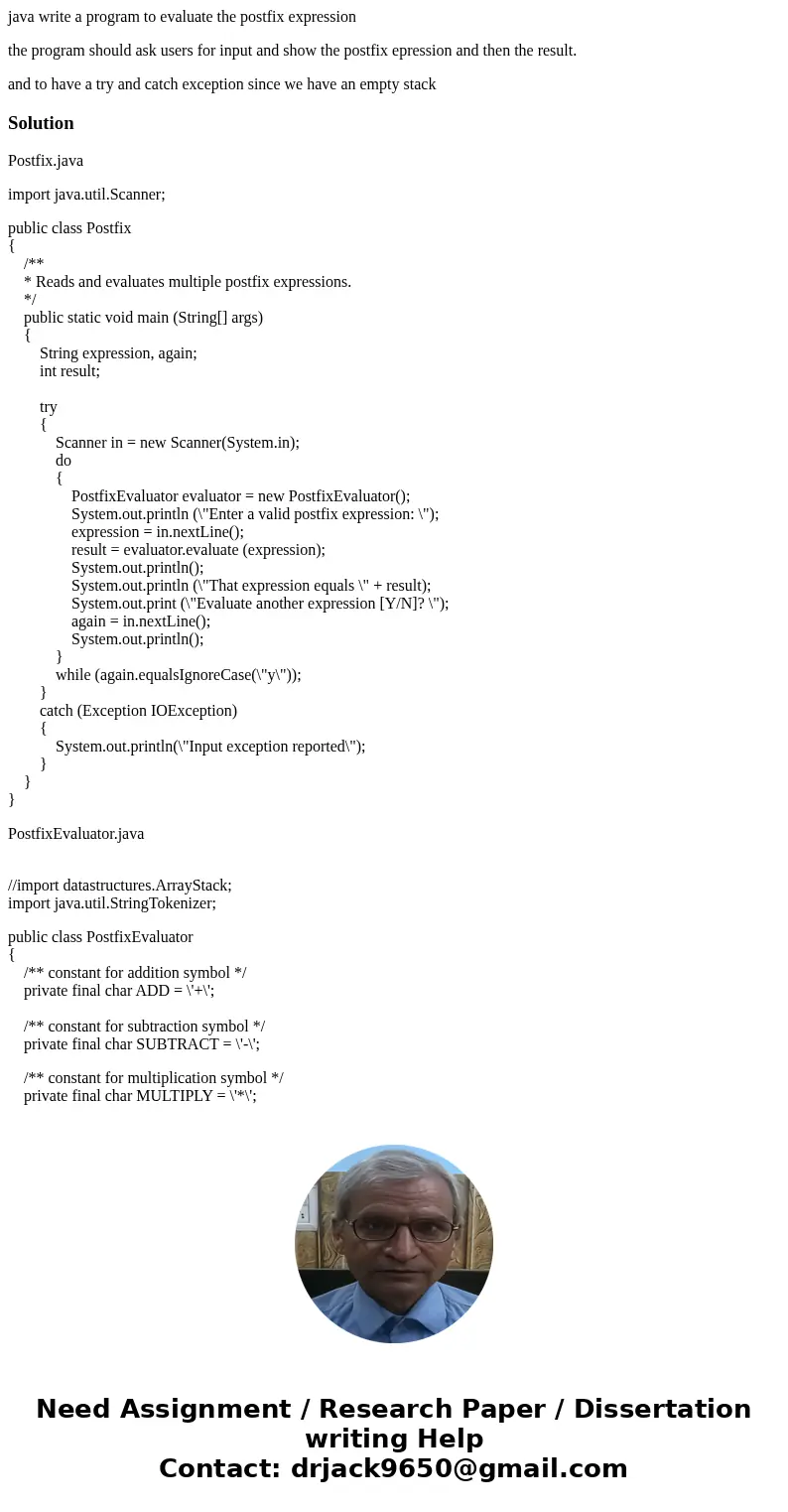
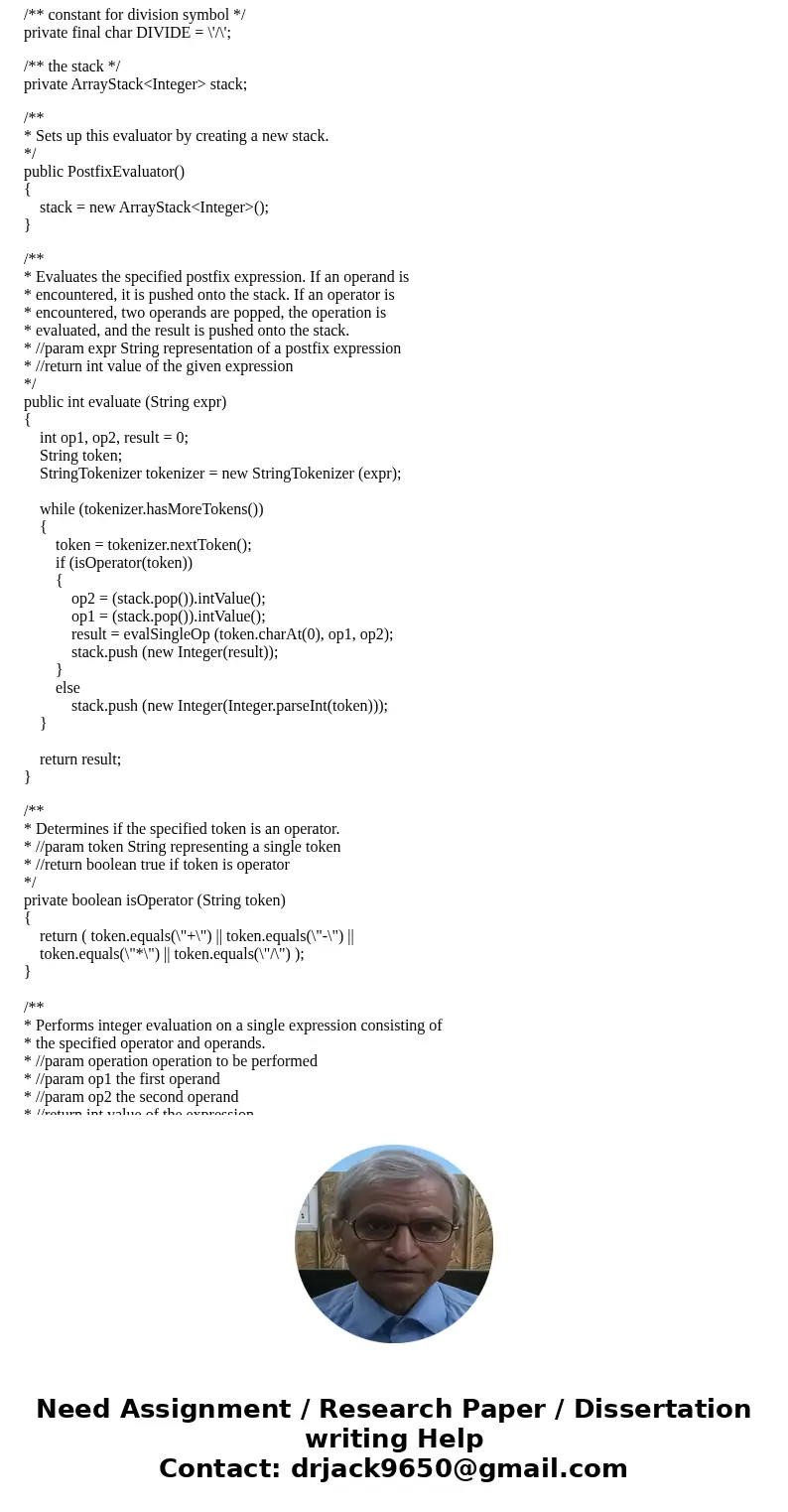
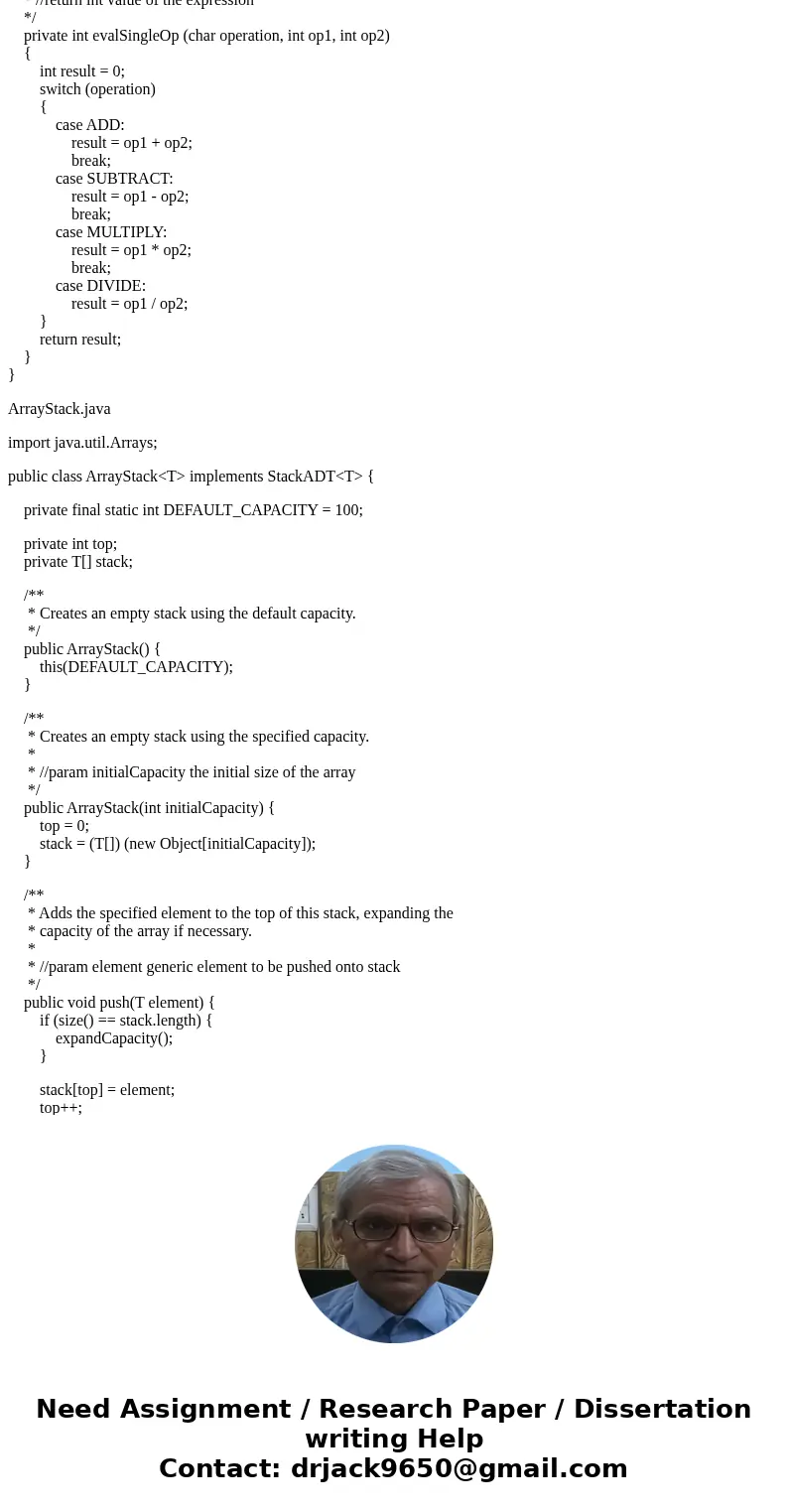
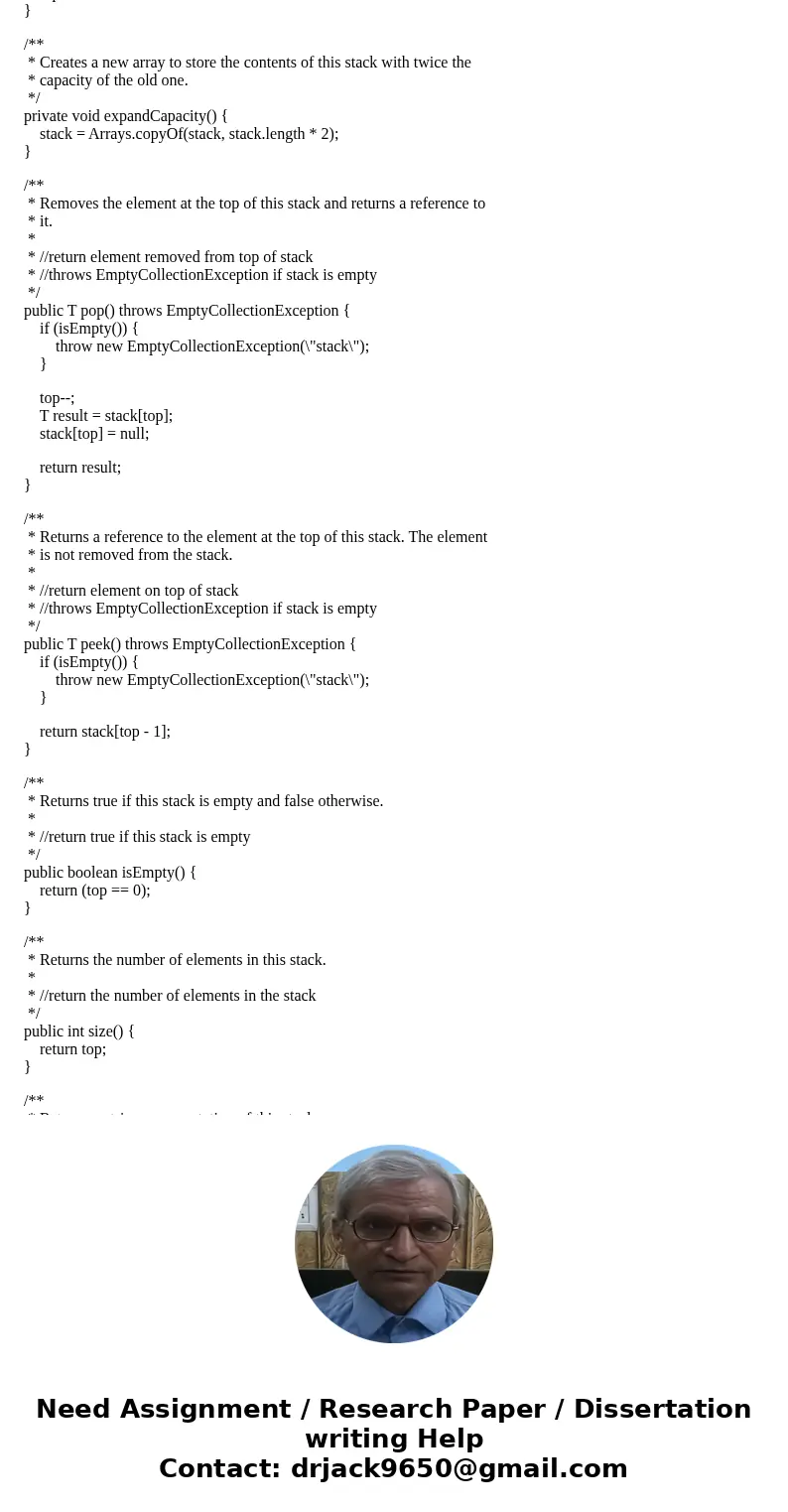
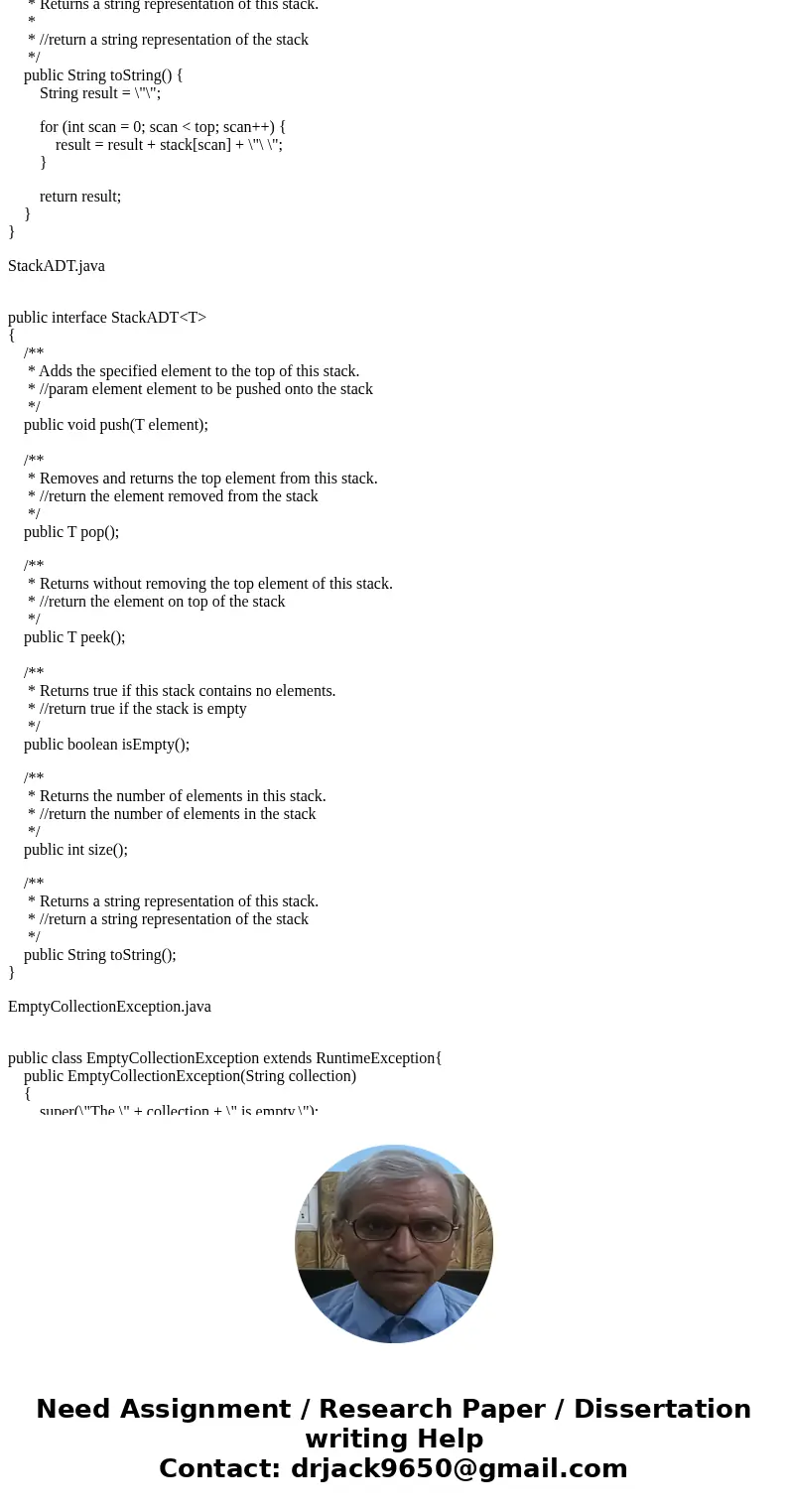
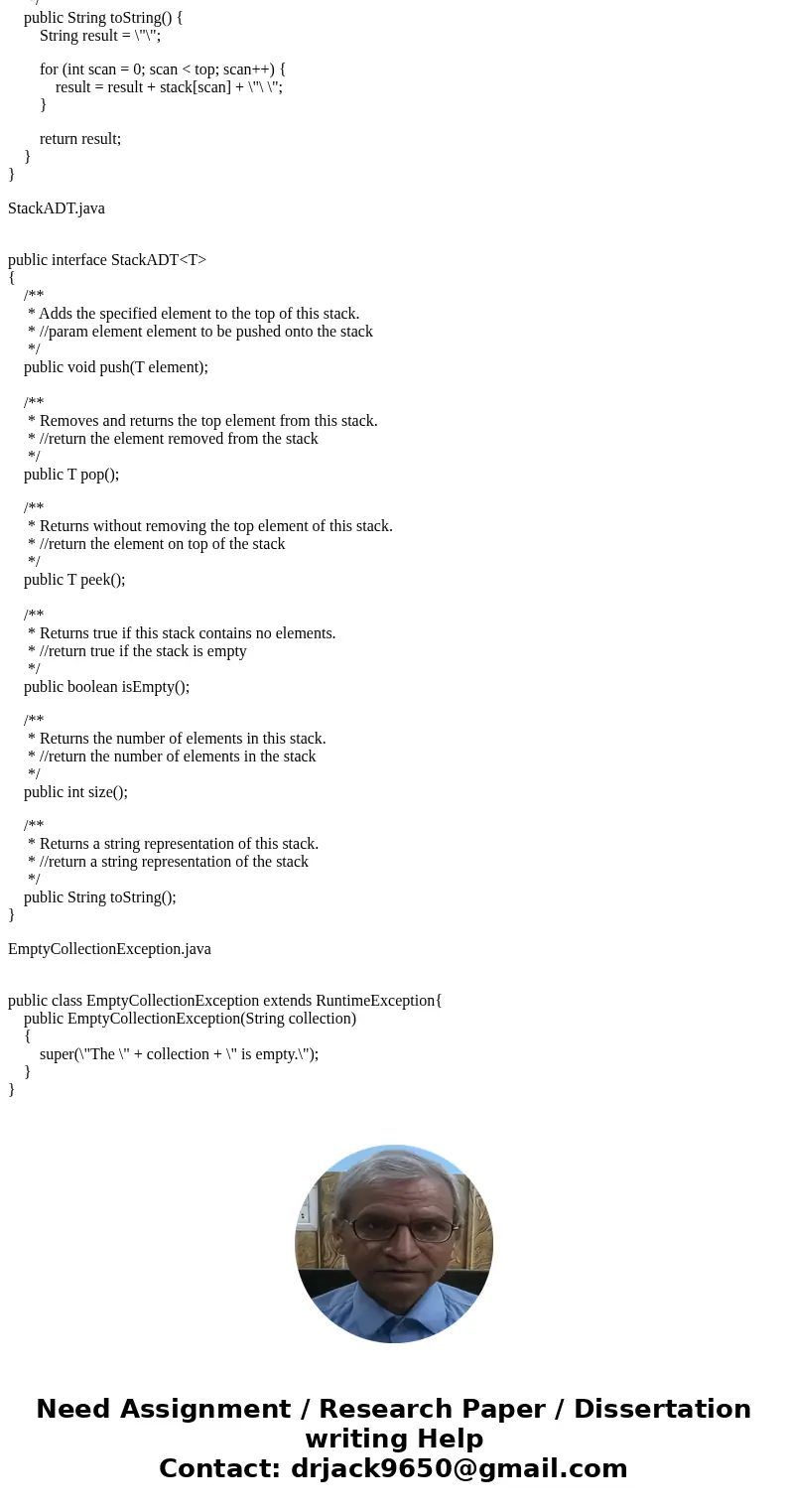
 Homework Sourse
Homework Sourse